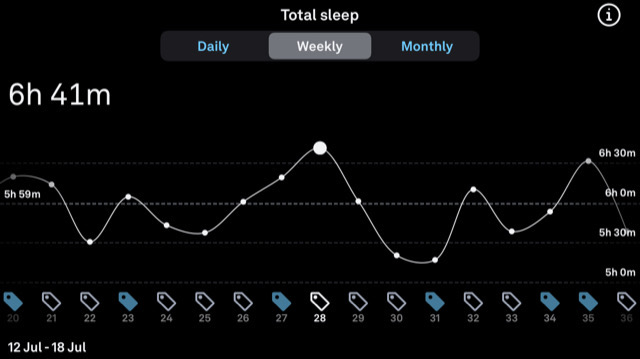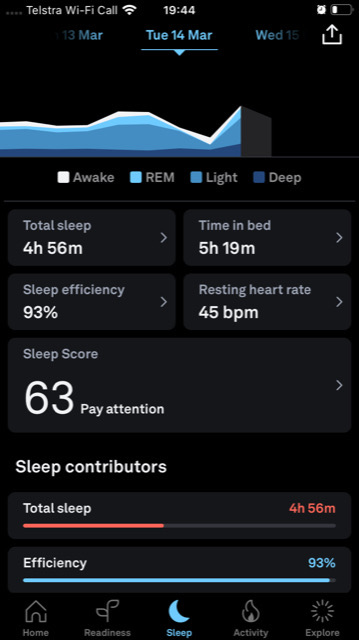It is one of the most important aspects of overall health and wellbeing, and a critical component so far as training, riding & racing is concerned. Here Dr Gemma Sampson discusses sleep.
Getting less than seven hours of sleep per night can limit our cycling performance and recovery by impairing cognitive performance and mood, disturbing glucose metabolism, appetite regulation and immune function.
If you regularly ride in the early hours of the morning before the traffic hits or jump on the turbo late at night after work, it’s worth exploring how your sleep habits support or compromise your cycling performance.
As someone who has long struggled with sleep and barely hits six hours on a good day, the biggest thing I struggled with living in Sydney this past year was juggling the internal conflict between my desire to socialise on early morning bunch rides and prioritising sleep.
I have tracked my sleep for three years with an Oura ring and despite actively working on it, my average sleep still falls short of the mark at 6h and 12 minutes.

Joining a bunch ride starting at 5 or 6am would compromise my sleep quantity to less than five hours a night – no matter what time I went to bed to try and counteract this!
Losing an hour of sleep in the early hours of the morning to go for a ride had a glaringly obvious impact on concentration, energy levels and performance the rest of the day.
Why does it matter how much sleep you get as a cyclist?
Ensuring adequate sleep is essential for our physical and mental health and well-being as cyclists.
Sub-optimal sleep on a regular basis can limit your cycling performance and recovery by impairing cognitive performance and mood, disturbing glucose metabolism, appetite regulation and immune function.
Sleep deprivation has been compared to being in a drunken state when it comes to reaction times.
If you are a cyclist who competes, every second counts and this is particularly the case in elite sport where a fraction of a second can mean the difference between winning or losing a race or event. Whether racing, training or going about your daily life, everything comes back to rest, recovery and recouperation. Improving your sleep quality and quantity can improve concentration and allow faster reaction times on and off the bike.
From a recovery perspective, optimising sleep enhances muscle repair to ensure the most can be gained from each training session.
“…By depriving our bodies of sleep, glucose metabolism is impaired…”
Sleep duration, quality and timing can impact production of hormones including insulin, ghrelin, leptin, cortisol, growth hormone and glucagon over a 24-hour period, influencing metabolic control. By depriving our bodies of sleep, glucose metabolism is impaired, meaning that the way our bodies are able to utilise fuel during exercise is compromised.

From a power-to-weight ratio perspective, there is growing evidence that chronic partial sleep loss can increase the risk of weight gain and compromised body composition. A good reason to get enough shut-eye alone!
Sleep plays a critical role in balancing hormones. For young healthy men, a week of reduced sleep intake from eight hours to less than five hours a night can reduce testosterone levels by 10-15%.
When normal testosterone decline Is about 1-2% per year through ageing, the overlap of symptoms of both sleep deprivation and low testosterone levels include low energy, reduced libido, poor concentration and increased sleepiness are worth considering. Similarly in women, impaired sleep is closely linked with menstrual irregularity, impaired reproductive function and altered hormonal profiles.
For people who struggle to get adequate sleep at night, incorporating short naps of 20-30 minutes between the hours of 1300-1600h can support concentration and alertness, improve mood and performance.
A caffeine dose of 150-200mg taken in the form of a coffee just before your nap can be a useful strategy to help avoid getting into deep stages of sleep to counteract mid-afternoon sleepiness and supplement sub-optimal sleep.
The first step to improving your sleep is understanding your current habits and any factors influencing sleep. Do you need to set stricter boundaries with bedtime routines? Create a darker environment with block-out blinds or an eye mask? Could you incorporate a midday or mid-afternoon nap? Use these findings to establish better good sleep hygiene habits and make smarter decisions when it comes to your sleep quality and quantity. Personally, tracking sleep patterns with an Oura ring played a role in my conscious decision to prioritise sleep over early morning rides. As a result, I often chose that extra hour of sleep, would ride solo during the day and incorporated mid-afternoon naps on days when I did have an early ride to supplement my sleep deficit.
While not everyone has the luxury to ride ‘pro hours’, any cyclist serious about optimising their health, body composition, performance and recovery between cycling training sessions would benefit from assessing their sleep habits and considering ways to support better sleep habits and hygiene.
That said, to support recovery having just flown back to Girona, I’m off for a nap!


